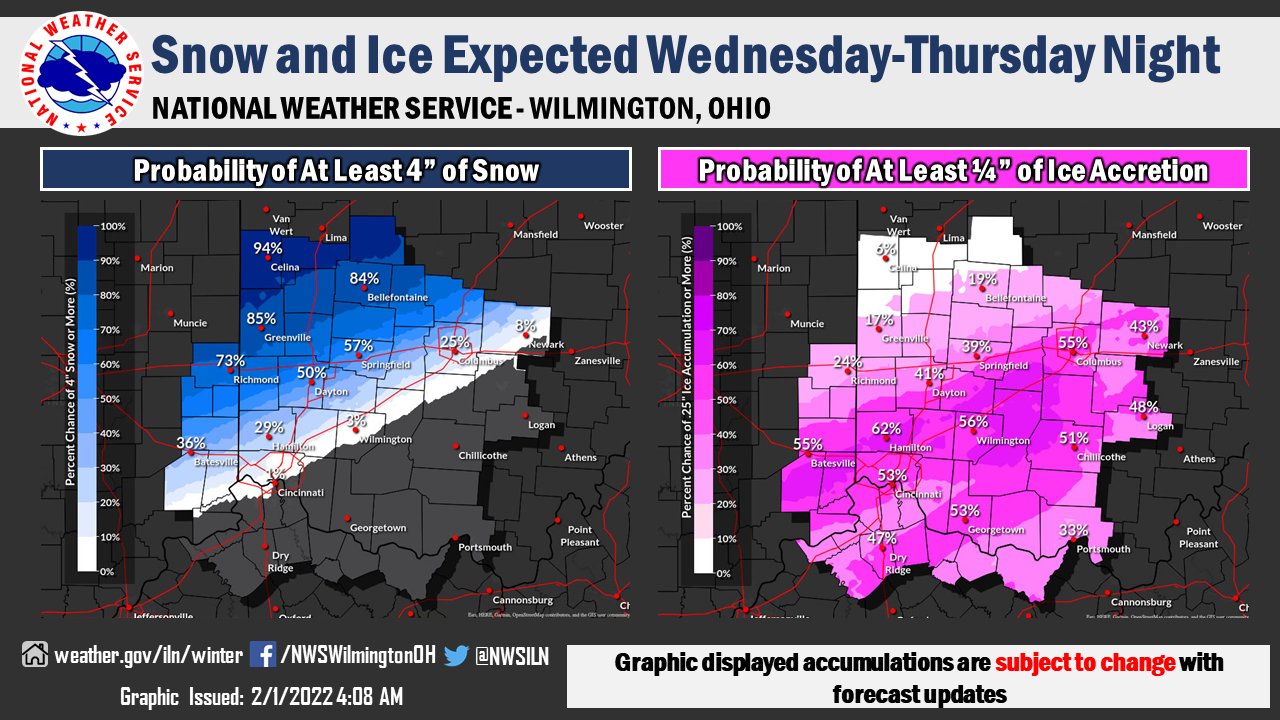According to the National Weather Service we are expecting some potentially severe winter weather later on this week!
Here are some great tips for preparing yourself (and why milk and bread may not be the best idea this time!)
Generally, ice storms are the biggest cause of winter time power outages. The ice freezes and pulls down the lines and can take time to repair if the roads are not safe. If you go to the store and stock up on items that are perishable, you may run into some problems with food spoilage so we recommend stocking up on
High-protein and non-perishable foods
Those include foods like energy bars, and fruit bars that don’t need to be refrigerated or frozen. Dry cereal, granola, peanut butter, dried fruit and canned tuna can also be helpful!
Canned goods
Ready-to-eat canned meats, fruits, vegetables and canned juices are a safe bet but you will need a manual can opener. Canned dietetic foods, juices and soups may be especially helpful for elderly or ill people, according to the Federal Emergency Management Agency. Also, take note that if a can is swollen, dented or corroded, do not eat from it.
Comfort food
Though not essential, who doesn’t want a box of Little Debbie snack cakes or a bag of potato chips?
Water
Store at least three days’ worth of water supply for each person in your household and for each pet. FEMA recommends storing at least one gallon of water for each person in your household for each day you could be without power. If this storm is anything like ones we’ve had in the past, it may be a week or longer.
Paper plates, cups and disposable utensils
If you’re out of electricity and/or water, having paper plates and utensils can help you prepare and eat your meals safely.
It’s always good to have a disaster kit at the ready that’s in a portable container near your home’s exit. You never know when you may have to leave your home for some reason, or need supplies you can’t find in the dark, so gather everything you’ll need in advance.
Have an emergency kit
Those should include: non-perishable foods and a three-day supply of water, a battery-powered radio and flashlight, extra batteries, a first-aid kit with a manual, sanitation items, matches in a waterproof container, a whistle to signal for help if you need to, clothing, blankets and sleeping bags, identification cards, credit cards and cash, paper and pencil, items to cover baby and pet needs and any special items like medications, contact lenses, glasses, hearing aids and activities for younger children.
Because of the ongoing Covid-19 pandemic, you should also include things like face masks.
When it comes to your vehicle, you may end up stranded somewhere away from home, so stocking up on items in your car could be useful as well. Here are some great tips for your vehicle:
Fill up your gas tank
While in a winter storm you should try to minimize traveling as much as you can, to avoid getting stranded on the road. Make sure that if you do have to go out, you have a full tank of gas well in advance. If the power goes out, you may be unable to find an open gas station, or you could be stranded on a highway for hours while crews clear the roads.
Check your fluid levels and tire pressure
Make sure your anti-freeze, windshield washer fluid, and oil are all filled to their necessary levels. You can find winter-specific washer fluid that is designed to keep it from freezing. While most newer cars are designed to alert you if your tire pressure is low, it’s helpful to have a tire gauge on hand.
Replace older batteries
If your vehicle has an older battery, it’s a good idea to replace it before temperatures drop too low.
Throw some winter clothes in the trunk
Like an extra jacket, gloves, scarf and hat or a blanket will help keep you warm if you are stranded. You should also consider boots if you aren’t already wearing them and a poncho in case of rain.
Paper plates, cups and disposable utensils
If you’re out of electricity and/or water, having paper plates and utensils can help you prepare and eat your meals safely.
Battery-powered flashlight, flares, or bright colored materials
To signal for help if you run off the road
Jumper cables, kitty litter, and a shovel
Will all help you get back on the road if you’re stranded or your battery won’t start your car.
Some other ideas to consider are dragging your generator, kerosene heater, or battery powered lamps out from their storage places in your garage or shed before a storm begins so you’ll have them ready to go. Remember, never bring items like gas powered generators and heaters in the house because they may cause carbon monoxide poisoning. Never bring a grill inside your home for cooking either.
Create a plan with your family to contact each other in case someone is stranded at work or school.
And always, always, steer into your skids! If your vehicle fishtails slightly to the right, steer to the right.

